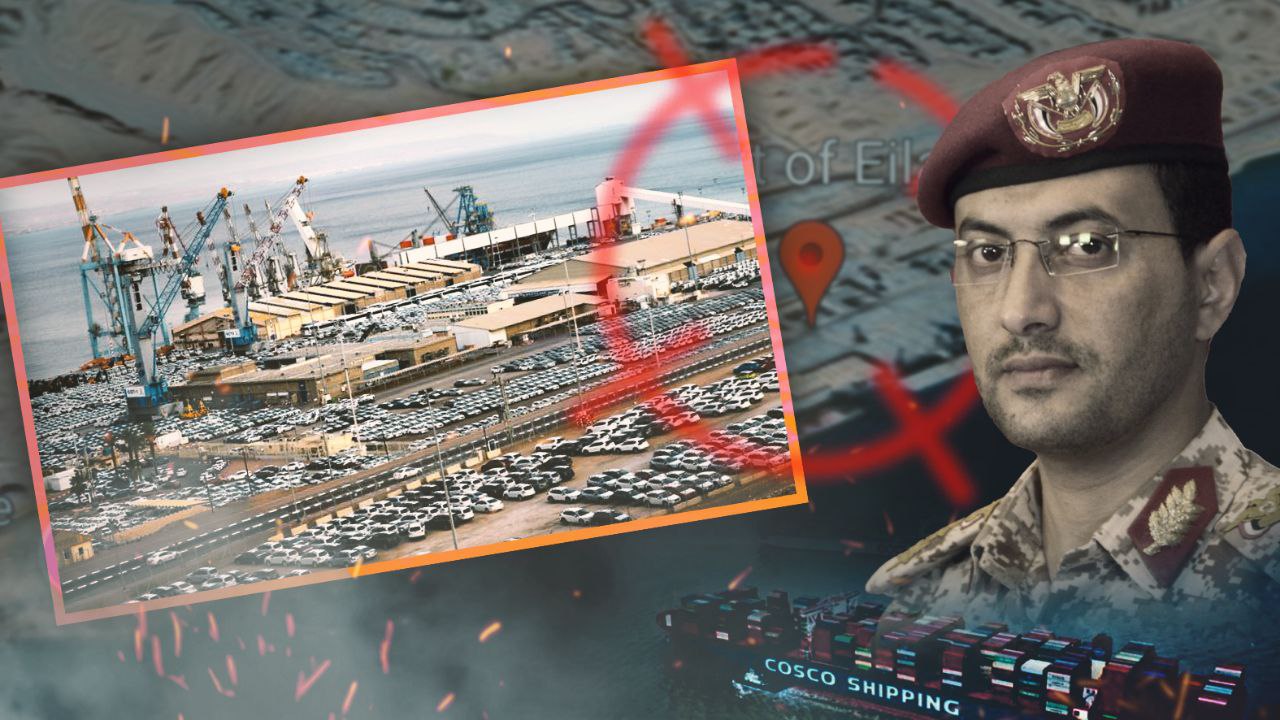Published: Muharram 26, 1447 AH
In a defining historic moment, a curtain falls today on a long-standing source of anxiety for the 'Israeli' entity: the official announcement of the closure of the port of Umm ar-Rashrash—"Eilat"—located at the southernmost tip of occupied Palestinian territory. This closure, a direct result of Yemen’s persistent naval operations in the Red Sea, is not merely a painful economic blow; it stands as indisputable testimony, from the mouths of the enemy, to the unprecedented Yemeni support for Gaza and the ability of the Yemeni Armed Forces to impose new equations in the region.
Active Resistance, Not Hollow Rhetoric
Yemen’s support for Gaza has not been limited to hollow political stances, but was manifested in concrete actions that astonished the world. From the very first moment of the aggression on Gaza, Yemen—despite its harsh conditions and the siege imposed upon it—transformed into an unyielding fortress of resistance. In the face of American and 'Israeli' intimidation, the Palestinian pain became a driving force for the Yemeni Armed Forces to innovate and manufacture.
Thus emerged hypersonic missiles and advanced drones that struck deep into the heart of the 'Israeli' entity in occupied Palestine, causing unending distress in Tel Aviv.
But the story did not end there. At sea—where power and defiance are most visibly demonstrated—the Yemenis recorded a unique naval triumph. With modest resources, the Yemeni naval forces managed to impose a suffocating blockade on the 'Israeli' entity, preventing ships from reaching the ports of occupied Palestine via the Red Sea.
At the heart of this battle stood the port of Umm ar-Rashrash, where maritime activity became a mirage. Shipping companies incurred significant losses, and the port's final closure became a stark reality.
Why Was the Port of Umm ar-Rashrash Closed?
On July 16, the 'Israeli' enemy announced that the port would cease operations on July 20 due to its inability to pay debts following a sharp decline in revenues caused by the naval blockade enforced by the Yemeni Armed Forces.
According to the enemy's Channel 12:
"The Umm ar-Rashrash municipality was forced to seize the port's accounts, and therefore its gates will be closed starting Sunday."
The debts amount to around 10 million shekels (approximately $3 million), resulting from non-payment of taxes. The channel attributed the financial collapse to “the Houthis’ aggressive activity in the Red Sea.”
Official data confirms the port’s 2024 revenue fell to just 42 million shekels ($12.52 million), down from 212 million shekels ($63.19 million) in 2023—a staggering 80% drop.
Umm ar-Rashrash has long been a strategic asset for the Zionist entity, its only Red Sea port and a key gateway to Asia and Africa. It was the central point for car imports (half of all imported vehicles), as well as exports of fertilizers and minerals. The port also hosts the critical oil pipeline linking Umm ar-Rashrash to Askalan on the Mediterranean.
Cargo activity began collapsing in Q4 of 2023, coinciding with Yemen’s naval escalation in November. By June 2024, the port had handled only 354,000 tons—an 85% drop from its 2014 volume of 2.31 million tons.
Implications for Haifa Port
Fearing a similar fate, Zionist officials are scrambling to maintain insurance coverage for vessels indirectly tied to the entity.
According to Middle East Eye, repeated Yemeni attacks have sparked debate within maritime insurance markets. One source stated:
“There is currently a major discussion in the market about whether insurance companies should cover ships with indirect links to 'Israel'. This is not in 'Israel’s' favor. The overall picture is grim.”
U.S. insurer Travelers recently declined to renew war-risk coverage for the Eternity C, prompting an estimated $20 million loss for its Greek operator.
This development has shaken confidence in Zionist port logistics. As a maritime security official explained:
“Ships will start avoiding docking in 'Israeli' ports. It’s not just about Houthi attacks—it’s the real possibility of losing insurance. Does a secondary or even tertiary association with 'Israel' mean you’ll be denied coverage?”
Undeniable Testimonies of Yemen’s Influence
Western and Zionist media long downplayed Yemen’s operations—but reality proved undeniable.
U.S.-based The Cradle reported that Umm ar-Rashrash could not continue operations under the ongoing Yemeni blockade of Red Sea traffic linked to the Zionist entity. It confirmed Yemen’s success in shutting down one of the occupation’s most vital maritime arteries.
Zionist financial daily Globes reported that the Yemeni blockade led to the total paralysis and official closure of Umm ar-Rashrash on July 20, 2025—an unprecedented event in the history of the occupation.
The closure was preceded by the freezing of bank accounts and the failure of last-ditch negotiations—further highlighting the pressure exerted by Yemeni operations.
Zionist paper Calcalist also acknowledged the event as a clear military and economic victory for Yemen.
Strategic Dilemma and Long-Term Fallout
OilPrice, a UK-based energy publication, outlined the strategic bind facing the occupation:
“The 'Israeli' government faces two difficult options: either absorb the losses from the continued closure of this strategic port or abandon the Red Sea route altogether.”
The blockade affects not only general trade, but also critical exports like potash and oil transported via the Umm ar-Rashrash–Askalan pipeline.
According to energy analysts, the financial collapse of Umm ar-Rashrash highlights “the fragility of the Zionist logistical infrastructure in the Red Sea, now under sustained pressure from Yemeni operations.”
A Powerful Message: Yemen Shifts the Rules
The closure of Umm ar-Rashrash is more than an economic event—it is a decisive strategic victory for the Yemeni Armed Forces, which have established a new deterrence equation and altered the balance of power in the region.
Despite all American and Zionist attempts to bypass or mitigate the blockade, Yemeni forces responded with firm action—most notably the sinking of the Eternity C and Magic Seas in the Red Sea. These strikes delivered a crystal-clear warning to shipping companies: cooperation with occupied ports carries serious consequences.
Today, vessels crossing the Red Sea identify themselves to Yemeni naval units and declare no ties to the Zionist entity—proof that Yemen, despite its limited resources, has upheld Gaza with unmatched sincerity and resilience.
U.S. Prestige in Decline, Western Hegemony Challenged
The inability of U.S. and allied naval forces to protect Zionist-linked shipping underscores a dramatic erosion in American prestige.
Washington’s much-touted Red Sea coalition has failed to prevent the closure of Umm ar-Rashrash, undermining claims of Western dominance in maritime security.
This outcome sends a signal across the region: the will of the Yemeni people has prevailed over some of the most advanced naval fleets in the world.
As global confidence in U.S. hegemony declines, other regional powers may be emboldened to challenge Western dominance, accelerating the transition to a multipolar world order.







